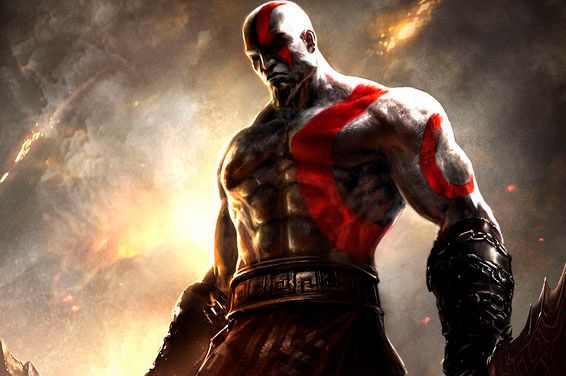
I've always had a thing for Greek mythology, I just found it fascinating. A lot of it is just downright insane, but I've always looked at it the same way Lord of the Rings fans look at their beloved franchise, it's just fun. I've always loved media based on the Greek myths: the original Clash of the Titans, the Percy Jackson book series, and I even enjoy the film 300 because I like watching half-naked dudes sweating and wrestling each other because it's totally NOT homoerotic. At all. Quit trying to say it is. Anyway, it seemed inevitable that I would love the God of War series, despite the fact that the series took me by complete surprise.
I was a naive 20-year-old kid when the original God of War hit the shelves of the local Blockbuster Video I was earning a lackluster paycheck at. I hadn't really heard anything about the game outside of a small article I read in Electronic Gaming Monthly, where it shared time Devil May Cry 3: Dante's Awakening and Rise of the Kasai. The article spoke about how a new era of hero had arrived on the PlayStation 2, but I glossed over the God of War information in order to read about a young Dante. Little did I know at the time that God of War would become one of my favorite games for the PS2, and would later become one of my all-time favorite franchises.
I honestly had no intention of playing the game until a friend told me how much he had enjoyed it, and once the game returned to my store (because we had only received two copies), I checked it out. After I had to return it to work, I went out and bought a copy for myself so I could continuously guide Kratos through his quest for vengeance against Ares. From then on, every God of War game became a must-play title for me outside of God of War: Betrayal, the mobile phone game (even though I've heard it was actually pretty good). I recently played through the entire series again after picking up the God of War Saga. I went through all five games included in about a month, and it was interesting to see just how little the game changes from entry to entry yet somehow still manages to seem fresh. I ran a marathon with the Ghost of Sparta, Kratos, and I've cataloged our journey together.
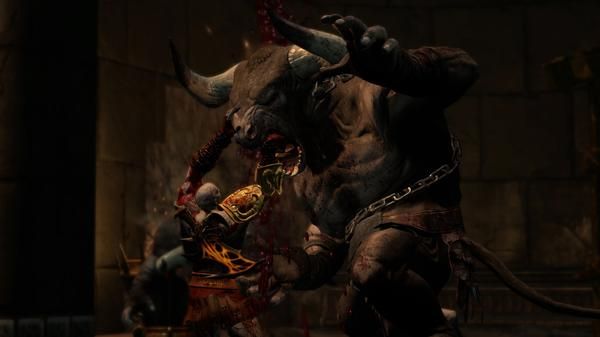
I decided to play the games in chronological order, which mean that Chains of Olympus was where I started. I originally played the game on it's native platform, and remember enjoying it quite a bit. As a matter of fact, this was the game that convinced me to buy a PSP to begin with, as I had picked up the Chains of Olympus PSP Bundle. The story takes place during Kratos' servitude to the gods, and Kratos is given the mission to find the sun god Helios after the sun falls from the sky, covering the world is darkness. He eventually discovers that it's all the works of the triple-team comprised of Morpheus, Persephone, and the titan Atlas. I don't want to bore you and give you every detail of the story, you could do that on your own if you really wanted to, but I just wanted to give you a quick overview. The God of War series, like I stated before, if one that doesn't change much from game to game, and the same rings true when they change developers and platforms. Sony commissioned Ready at Dawn Studios for this title, and they certainly stuck to the tried-and-true God of War formula. Not to say it's a bad thing, don't fix what isn't broken, but I would have preferred to not know what's coming.
That's the only real problem I have with the series, it's very predictable. It starts off with a bang, always fighting a giant mythological monster in multiple stages, and they usually make for the most memorable parts of the game, but after that, it's traditional hack-and-slash goodness with some platforming thrown in, and every now and then you'll encounter a puzzle that's more there just to slow you down than to make you think. It starts off in epic fashion, and while the rest of the game is good, it just doesn't compare to the way the game starts. It's also very easy to see battles coming. Several times throughout each game you will see a giant circular area coming up, and then the exits become blocked off as you enter and enemies spawn from all sides.
In my opinion, Chains of Olympus is the weakest entry in the series, but I still enjoy it. All the different types of magic you gain during the game are either boring or rip offs of magic from other titles in the series. The set pieces are good, but again, it looks so much like the rest of the series that you never get a sense that you're not seeing anything you haven't already seen before. You set out to the Temple of Helios to awaken the Fire Steeds, very reminiscent of how you had to awaken the Steeds of Time from God of War 2 in order to progress. You fight your way out of Tartarus, just like how you had to fight your way out of Hades in the original, and very briefly in the sequel, and then this area was used again in GoW III. There weren't a lot of new enemies used for this game, although you do fight through members of the Persian army, which is unique to the series, as the majority have you only squaring off with the undead and Greek monsters.
Despite all this, I did enjoy the section of the game where Kratos is reunited with his slain daughter, Calliope, in the Elysium Fields only to learn of Queen Persephone's plan, which would bring about the end of the world. Kratos then has to turn his back on the only thing he wants in the world for the greater good. It seems a bit out of character, considering that the only thing Kratos wants is to be rid of the nightmares from the night he had accidentally killed his wife and daughter in the heat of battle. If Persephone succeeds, it means the end of existence, which means that Kratos can finally be rid of the images that torture his soul. It was unlike Kratos to care about what happens to humanity, but it was also a bit heartbreaking for anyone that had played the other games to have to sacrifice reuniting the anti-hero with the only thing in the world that he loves. Unlikeable as he is, you still don't want to do it, as Calliope cries out in sadness every time Kratos must push her away.
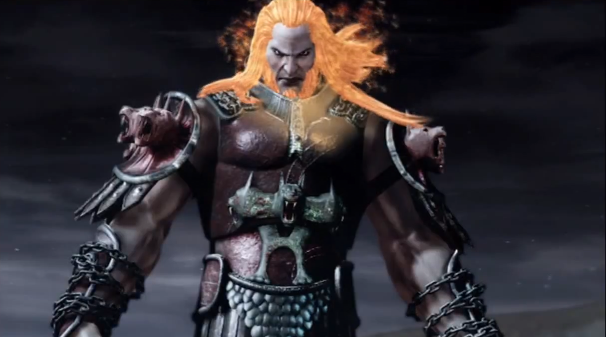
Moving on in the Kratos saga brings me to the original God of War, my personal favorite in the series. I don't think it's the best game of the franchise (or even the second best), but it just blew me away so much when it was first released, and it will forever have a spot in my heart. The game starts with Kratos attempting suicide by jumping off the highest mountain in all of Greece, and just before he hits the water you receive a black "Three Weeks Earlier" screen and begin your adventure on the Aegean Sea in the midst of an attack at the hands (or heads) of the Hydra. After besting the multi-headed beast, Kratos makes his way to the city of Athens with one thing in mind, to kill Ares, the God of War, for the atrocities he had forced Kratos do commit during his time of servitude. He learns that the only way to slay a god is with the help of Pandora's Box, inside the Temple of Pandora, which rests on the back of the titan Cronos.

Going back and playing this game for the first time in several years brought back a lot of memories, most of them good, but not all. I had forgotten a lot of things about the game, like the fact that tapping the R2 button was the prompt for opening doors and gates, on the PS2 this wasn't a problem, but with the DualShock 3's trigger-like rear buttons, I found it difficult to tell if I was actually pushing the button in enough to actually open the door, and often found Kratos wimping out and lowering it to the ground. I had forgotten about the existence of The Rage of the Gods and how it gives Kratos a really stupid mohawk. I had forgotten certain encounters and characters. It was nice going back and conquering the Temple of Pandora one more time. I do think the game could have used more boss battles, as there are only three, and one of them takes place at the very beginning of the game, and you don't encounter the giant minotaur until you're in the final few hours. I can't knock the game for reusing set pieces or enemies here, as it was all new at the time, and it was all awesome. It was interesting to see their depictions of the cyclops, sirens, and satyrs, among others.
Now I feel is a good time to talk about just how great the Blades of Chaos feel. All throughout the series you're given additional weapons to try out, but none of them feel as good as the blades, with one exception which I'll speak about when we get to God of War III. The original GoW gives you the Blade of Artemis, while it may be powerful, it is also slow and monotonous, and ultimately, unsatisfying. The magic, however, is the best in the series for one reason: Poseidon's Rage. There's a reason why you began the sequel with Poseidon's Rage as the only type of magic Kratos retains, why you can unlock it for use in other entries, and why NECA made a Poseidon's Rage version of Kratos for their toy line. Bottom line, Poseidon's Rage is the best magic you receive in the entire series. It's a necessary key to ensuring victory.
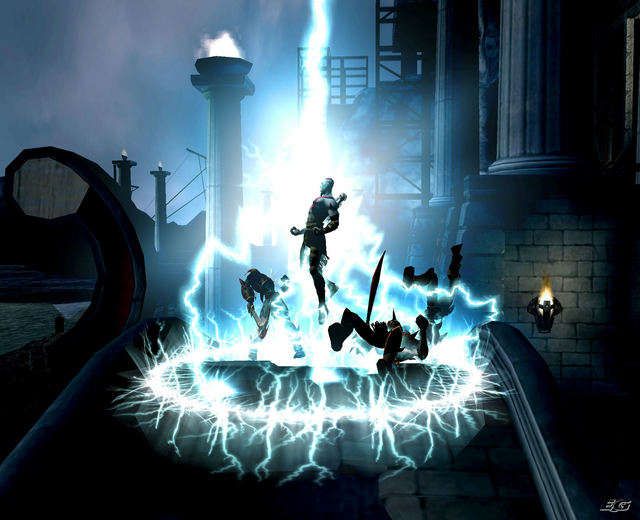
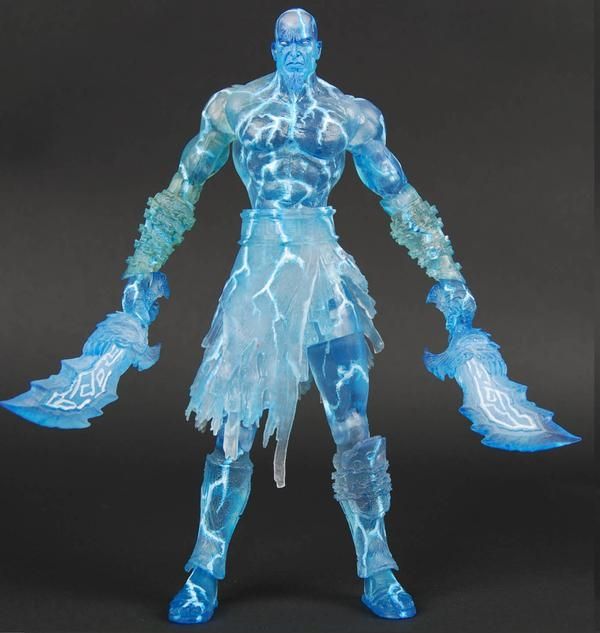
The final battle with Ares is still my favorite final boss of the series. It doesn't require much strategy unless you play on the harder difficulties (I played them all on their equivalent of Normal), but I just have a thing for two dudes squaring off one-on-one with swords, it just seems so manly, so old school. As the uninformed 20-year-old kid that I was, I didn't think there would be a sequel, let alone an entire series of additions. I felt like walking atop Mount Olympus and having Kratos sit upon the throne as the new God of War was the perfect way to end finish the journey.
Moving on we come to the midpoint of this marathon, God of War: Ghost of Sparta. Unlike every other title in the God of War Saga, this was actually the first time I played this one. By the time it was released on its native platform, I had no way of playing it, having long since sold my PSP due to being a poor college kid in need of some fast cash. If I had played it when it had come out, I dare say it probably would have been my favorite game on the PSP, and it makes a strong case for being the best in the franchise, but like I said, my judgment may be a bit skewed as this was my first playthrough. I will say, however, that this installment easily has my favorite story. Veterans of the series certainly remember the videos that you unlocked after beating the original title. They gave you possible stories for future games, and one of them involved Kratos as a child, telling the story of how he and his brother were separated at birth. Kratos went on to become the God of War while his brother was killed and grew up in the underworld. While this wasn't the story for the sequel, it eventually did see life in Ghost of Sparta.
This game starts off very similarly to the original GoW, with Kratos fighting on the open sea, being stalked by the monster Scylla, which bears no resemblance to how it looked in Castlevania: Symphony of the Night. It looks more like it was based on the Kraken from the original Clash of the Titans film. There were two things that I really enjoyed and were unique to this entry in the franchise. One was the flashback sequences of Kratos going through his training with his brother Deimos as children. It doesn't really add much to the story outside of allowing us to see the softer side of Kratos, and showing the guilt he feels for not being able to save his brother. These sections also offer a nice little deterrent from the usual gameplay. The other section I really enjoyed was when Kratos finally arrives at his home, Sparta. Instead of running through the city smashing pots, as Kratos is wont to do, the player is forced to walk through the streets, all the while being praised by the citizens.
Once Kratos is able to rescue his brother, Deimos, rather than thanking him, is instead enraged that his brother was unable to protect him as a child, and has been living with vengeance on his mind ever since. After the God of Death, Thanatos, intervenes and Kratos saves his sibling's life, the two reconcile, and decide to fight alongside each other for the first time ever. This was another aspect of the game I liked, having an AI partner. Unlike other games, where partners are often nothing more than a nuisance, you never have to worry about Deimos, and it offers a fun little twist for the final battle. Deimos is killed almost immediately, which was a little disappointing, I would have liked to have been able to tag team some baddies for longer than you're given, but it's still an enjoyable section of the game, and was a very satisfying finale.
We now arrive at the original sequel, God of War II. After how much I enjoyed the premiere, it was a no-brainer that this would be a day-one purchase. Much like the original title, it starts off with a bang, having you go through a multi-stage battle with the Colossus of Rhodes. Of all the five game-beginning battles, this is the one I enjoy the least. It has nothing to do with the battle itself, it's simply because of what you're fighting. What? I'm fighting a giant statue? Why can't I fight some giant mythological monster like I did before? Dumb! Anywho, right off the bat you can see that Sony Santa Monica improved upon the original title, as opening gates has now been mapped away from the R2 button and onto the much easier to tap Circle button. It's a small change, but it's one that I appreciated. They also added the swinging mechanic, which varies up the platforming in certain sections, including a very memorable sequence just before you encounter Icarus. There was also the addition of being able to slow time, which is used on more than one occasion to solve puzzles. I think this was implemented nicely, they don't bash you over the head with it, and instead opted to use it sparingly and made it obvious when you were supposed to be using it. The sections riding Pegasus are new, and while they're fun and occur only a couple of times throughout the game, I feel like these sections go on a little too long.
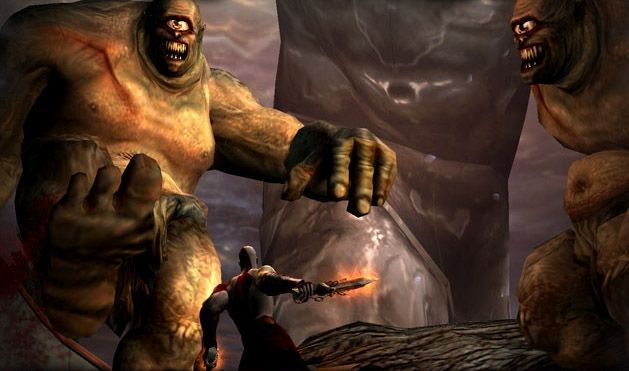
The story for this game is very simple: Zeus is not only terrified that what happened to Ares at the hands of Kratos will also happen to him, but he also is fed up with the way Kratos doesn't listen to the gods in higher authority and plays by his own rules, which causes Zeus and the gods to turn their back on Kratos and attempt to take his life. Kratos is then saved by the titan Gaia (who we also discover is the narrator of the series up to this point), the two form an alliance, and Gaia informs Kratos that he must seek the Sisters of Fate in order to change his past.
I think GoW II has the absolute best locales in the entire series. You have the mountain which houses Typhon, the Island of Creation, the swamps, the Temple of Euryale, atop (and inside) the titan Atlas, and the Temple of the Fates, each landscape completely unique from the one preceding it. They also crammed so much mythology into this game, it almost seems like you encounter someone or something from the mythology around every corner. I especially enjoyed seeing Harry Hamlin reprise his role as Perseus.
They once again decided to give you different weapons to try to keep the combat fresh, giving you the Barbarian King's giant warhammer, and the Spear of Destiny. I found the inclusion of the Spear of Destiny to be very odd, as it's not from Greek mythology at all, and is actually from Christianity, the Spear of Destiny being the spear the pierced Jesus Christ while on the crucifix. But again, neither one of them hold a candle to the blades. The hammer is too sluggish, and the spear is just not a good weapon. It's a thrusting weapon, which results in missing your targets a lot during the beginning of your combos.
Despite my disappointment with the Colossus of Rhodes, I feel like GoW II has the best collection of boss battles to date. It was a very nice touch being able to do battle with the undead Barbarian King, and the final battle with the Sisters of Fate I think is the best battle in the entire series, as it uses not only the swing mechanic, but also the slowing of time as well. The section with the third sister, Clotho, is actually more of a mini puzzle than a battle, but it still very enjoyable.
The ending of the game is pretty good, which sees Kratos travel back in time to stop Zeus from betraying him, and results in a multistage battle that ultimately ends when Kratos accidentally kills his only ally in Athena, and the revelation that Zeus is Kratos' father. Kratos travels back in time once again to the time of the great war between the gods and the titans, and the final scene sees the titans climbing Mount Olympus in pursuit of the gods. You realize at that moment that things are about to get real.
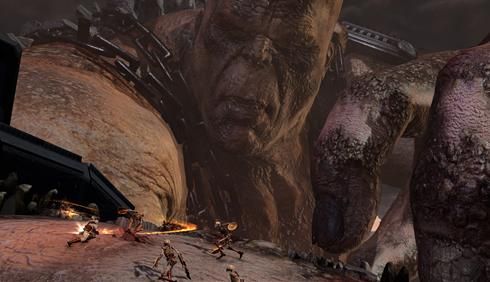
Thus, we've reached the final leg of this trek: God of War III. This was the first time I'd this one since it was originally released. The story is what you would expect. It picks up where the previous entry ended, and Kratos stops at nothing until all of the gods of Olympus are dead. There's some twists and turns in there, but that's the gist of it. The first thing that jumped out at me is how much better that game looks than all the others. That's to be expected, I mean they were working with a more powerful machine in the PlayStation 3, and three years after the game was originally released it still looks fantastic. Kratos, rather than being a pure white, now has a tint of gray. This new hue makes our anti-hero seem more brutal. In God of War tradition, you begin the game by battling a giant monster. In this case it's the Hippocampi and Poseidon, but this is the only game in the series where the beginning battle is not the highlight of the game, that doesn't occur until you take down the titan Cronos.
The use of secondary weapons was a nice addition. The Bow of Apollo is a weak long range attack, but can be charged up to add some extra damage. The Boots of Hermes are pretty useless, I never found myself using them for combat, only for platforming sections that required them. The Head of Helios is the most effective secondary weapon in the game, and has multiple uses. It can be used to light the way in darkened areas, to find hidden paths, to uncover previously invisible treasures, or to stun enemies during combat. Speaking of secondary weapons, let's move on to the magic. They decided to do it differently this time around. Throughout the course of the game, Kratos acquires three additional main weapons: the Claws of Hades, the Nemesis Whip, and the Nemean Cestus. Instead of being able to use all your different magic attacks whenever you want, each main weapon has a specific magic attack unique to it. Basically what this means is that the only magic you're going to use in the game is the Army of Sparta, as it's the magic mapped to the Blades of Chaos (renamed the Blades of Exile). The Nemean Cestus and Nemesis Whip both have magic attacks very similar to magic found in previous entries. The Nemean Roar is a ground pound, and the Nemesis Rage is an electric attack almost identical to Cronos' Rage from GoW II. The Soul Summon (used with the Claws of Hades) is the most distinctive ability Kratos can use. Depending on how much you level up the Claws, you can choose from almost any enemy you encounter in the game to help you. Anything from a cerberus to cyclops can be summoned to fight at your side. The only problem is that I don't like using the Claws of Hades, so I have never really seen what this attack can really do.
One thing that Sony Santa Monica was finally able to do was to create a weapon that feels as good as the Blades. The Nemean Cestus, while having a pretty boring magic attack, are pretty awesome. You acquire these giant gauntlets after defeating Hercules, and I found that they shared equal time in use as the Blades. They're very similar to the gauntlets you receive in Chains of Olympus, but they just feel better here. It has to do with the feedback from the DualShock 3, you just don't get that from the PSP title. The Cestus just feels powerful. You feel like you're punching a hole through enemies, you feel like you're Ivan Drago.
Up to this point I've neglected talking about just how violent the series is. It kind of goes without saying, what do you expect for a series called God of War? God of War III really ramps it up, though. Instead of defeating a boss and then being given a QTE to finish them off in a scripted kill animation or cutscene, now you're given button prompts to finish your enemies off. For instance, in order to kill Poseidon you're given the prompt to push in the L3 and R3 button simultaneously to poke your thumbs through the water god's eyes. Later in the game you literally have to rip off the head of Helios, and they spared no expense when it came to the details, showing the skin ripping as Kratos pulls harder and harder. The final battle culminates with a first-person view of Kratos pummeling Zeus with knees and fists to the face. You could literally make this go on forever, as Kratos will continuously punch Zeus until the player has decided that they're tired of pushing the circle button.
I do have a few complaints about this game, the first being the cover art (both for God of War III and God of War Saga). It seems like a silly thing to complain about, but after the rest of the series had such great cover art, the cover for God of War III just feels lazy. I mean, look at it...
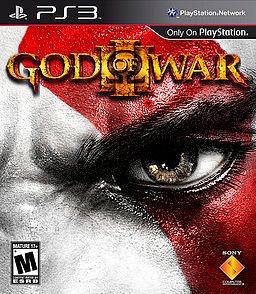
...how lame is that? A close up of his eye? Of all the awesome art I've seen for this series, and this is the cover you go with for your big, epic finale? The cover for God of War Saga makes me just as angry. Not because it's so simple, it's very similar to other collections on the PS3 like the Ratchet & Clank and inFamous collections, and those are fine. No, this cover upsets me because Kratos is holding the Nemean Cestus instead of the Blades of Chaos. Why? Kratos uses the same weapon for six games, one of the most iconic weapons in gaming today, and you decide to have him holding a different weapon for the collection? Despite my previous praise of the Cestus, it still doesn't deserve to be on the cover, and that bothers me.
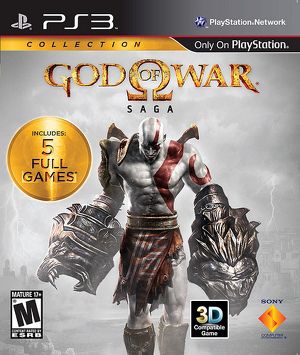
My biggest problem with God of War III is the story, or rather, the ending. The only thing fueling Kratos through his entire journey is revenge. How do you know this? Because he uses the words "revenge" and "vengeance" about 7,000 times throughout the course of his quest. Kratos discovers that the way to defeat Zeus is with the sacrifice of Pandora. Yeah, I get the fact that Pandora is supposed to be analogous to Callipoe, and Kratos wants to protect Pandora like he wasn't able to do with his daughter, but when you speak so much about how all you want is to kill Zeus and get revenge on the gods for what they've done to you, why in the world would you suddenly decide that you have a heart and care one iota about Pandora and try to prevent her from making the sacrifice that she's willing to make.
One other aspect of the story that bothers me is that in the original God of War, they make it seem like it's impossible to kill a god, and Kratos has to survive several trials in order to obtain Pandora's Box and unlock the power to kill a god. But in God of War III, Kratos kills Zeus, Poseidon, Hades, Hera, Helios, and Hermes, in addition to also killing Hercules (half mortal, half god), and two titans in Gaia and Cronos. So obviously, killing a god isn't all that hard. You don't even kill Hera or Helios in battle, you simply break Hera's neck because she's a lush and Helios crashes his chariot, which is enough to incapacitate the mighty sun god. The fight with Hermes is less a battle and more a mutilation simulator. Despite these complaints, I found God of War III to be the best game in the series, which I wouldn't have said back when I originally played it. The final ten minutes are a little weird, and the post-credits reveal didn't need to happen at all, but it's still an amazing game despite its story flaws.
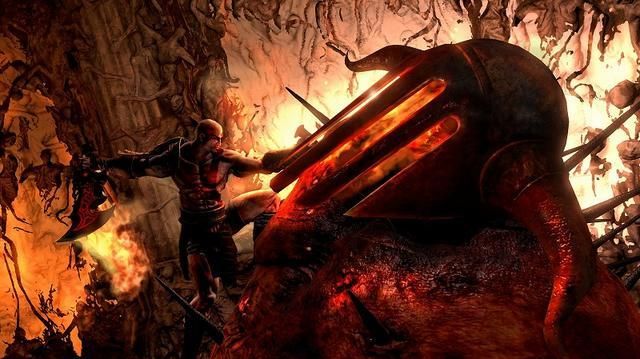
We've reached the finish line, ladies and gentlemen. Now we can take some time to catch our breath. It had been quite a while since I had taken control of Kratos, slashing my way to victory through hoards of mythological beasts. The games are just as enjoyable now as they always were. Some would argue that they're too similar to each other, but I would rather have sequels that are similar but good instead of sequels that try to do something different and ultimately turn out to be garbage. I'm very excited for the imminent release of God of War: Ascension, but it seems hard to imagine where else they can take the story. It's gone backward, forward, and in-between. They can't really go forward after God of War III unless they go with David Jaffe's original story idea, and they've already gone backward twice. I feel about God of War the same way I feel about Resident Evil, I absolutely love it, but I think it's time to call it a day instead of always milking your cash cow.
Thank you for reading.
Poseidon's Rage rules!
No comments:
Post a Comment